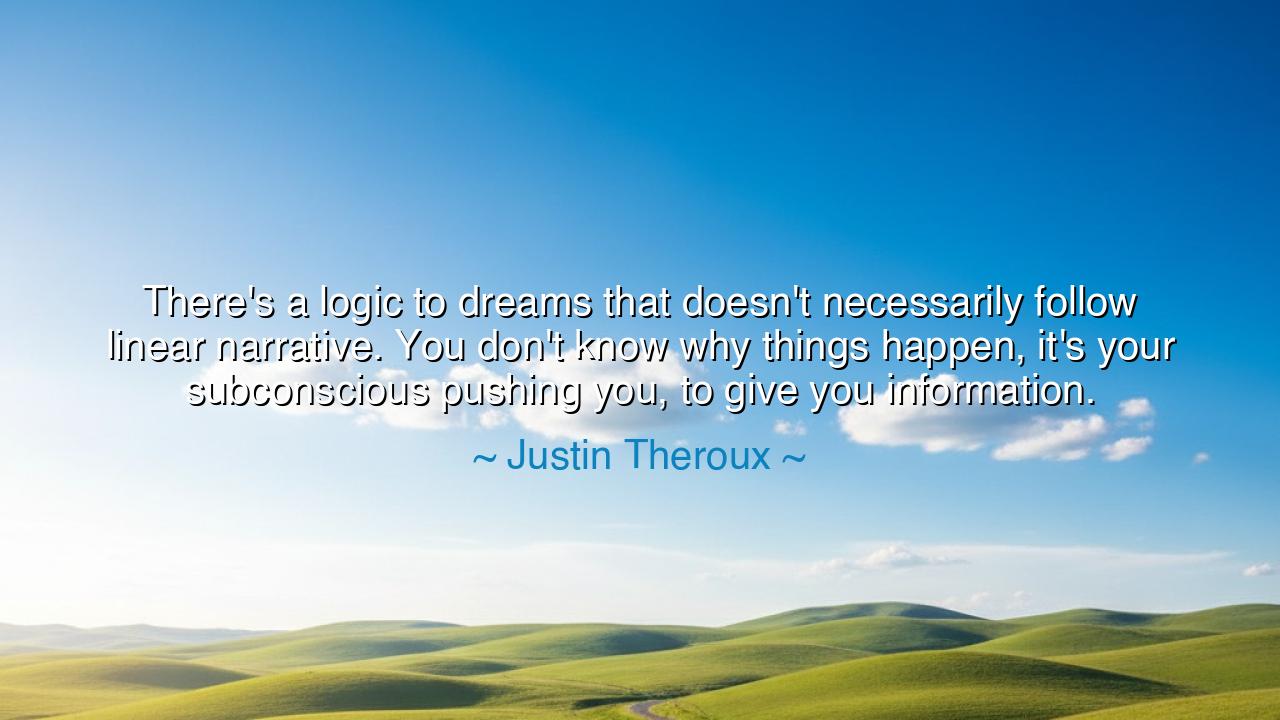
There's a logic to dreams that doesn't necessarily follow linear
There's a logic to dreams that doesn't necessarily follow linear narrative. You don't know why things happen, it's your subconscious pushing you, to give you information.






When Justin Theroux said, “There’s a logic to dreams that doesn’t necessarily follow linear narrative. You don’t know why things happen, it’s your subconscious pushing you, to give you information,” he spoke as one who had glimpsed the ancient mystery of the human mind — that hidden kingdom where truth wears the mask of symbol and reason bends before the will of the soul. His words remind us that dreams, though strange and chaotic, are not meaningless. They follow their own logic, the secret rhythm of the inner self — a wisdom older than reason, a language spoken by the subconscious, which seeks to guide and awaken us when our waking mind is blind.
The origin of this insight lies deep within the lineage of human thought. Since the dawn of civilization, our ancestors have regarded dreams as messages — from gods, from ancestors, or from the hidden depths of the spirit. The Babylonians recorded their dreams on clay tablets and interpreted them as omens. The Greeks built temples of sleep, where seekers would lie down and await visions sent by Asclepius, the god of healing. And the philosopher Aristotle wrote that dreams were the workings of the soul, expressing truths that reason could not grasp while awake. In this ancient stream, Theroux’s words flow naturally — for though our modern minds speak of “psychology” and “subconscious,” the mystery remains the same: within us dwells a voice that speaks through images and paradox, offering knowledge wrapped in riddle.
When Theroux says that dreams don’t follow a linear narrative, he is pointing to the way our inner world defies the tidy structures of waking thought. In dreams, time folds upon itself. We may be both child and elder, living and dead, hero and witness — all at once. We may stand in one place and yet remember another, feeling both joy and dread in the same breath. And though these things make no sense to the rational mind, they follow the deeper logic of emotion and truth. For the subconscious does not speak in lines and words; it speaks in metaphor. It shows us what we cannot yet admit, through images that startle and stir. To dream is to be taught by the soul in its own strange dialect.
Consider the story of Dmitri Mendeleev, the Russian chemist who struggled for years to find order in the elements. Exhausted, he fell asleep — and in his dream, the elements arranged themselves before him in a perfect pattern: the periodic table. He awoke with revelation. What reason had failed to build, the subconscious completed. Or think of Mary Shelley, who dreamt of a man brought to life by science — and from that dream, she gave the world Frankenstein, one of the greatest works of imagination. These stories reveal the same truth: that our dreams, though wrapped in mystery, are messages of creation, born from the deep intelligence within us.
Theroux’s insight invites us to listen — to see our dreams not as random illusions, but as mirrors of our unspoken fears, hopes, and wisdom. When he says the subconscious is “pushing you, to give you information,” he is describing the gentle insistence of the inner self, which longs to be heard. Dreams can reveal wounds we hide, paths we must walk, or truths we refuse to see in daylight. They are the whispers of intuition, the secret tutor of the human spirit. The wise learn to interpret them, not by logic alone, but by feeling — by asking, “What is this dream trying to tell me about myself?”
There is a lesson here, both ancient and practical: heed the voice within. In the rush of daily life, the conscious mind is loud and proud, filled with plans, fears, and noise. But the subconscious — that vast ocean beneath the surface — speaks only in silence, in images, in dreams. To understand it, we must become still. Keep a journal beside your bed. Write your dreams upon waking, even the fragments. Reflect upon their symbols — the house, the storm, the stranger, the fall. These are not random visions; they are signs from the unseen, fragments of your own truth reaching upward like roots seeking light.
And finally, let us remember this: the dream is not a lie — it is truth disguised as wonder. The world of waking life moves in lines and logic, but the world of dreams moves in circles and spirals, in rhythms closer to the eternal. To listen to your dreams is to draw nearer to the sacred center of your being. As Justin Theroux teaches, though their logic may seem strange, it is in that strangeness that the soul reveals its wisdom. So trust what rises in the night. For even in the dark, your spirit is speaking — guiding you toward the meaning your waking eyes have yet to see.






AAdministratorAdministrator
Welcome, honored guests. Please leave a comment, we will respond soon